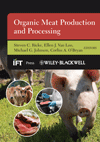PLANT-BASED MEATS REPORT 2024
Plant-Based Meats Report: Young consumers drive consumption
Taste and texture continue to complicate the plant-based protein category.

Corbion continually engages in research, exploring synergies between ingredients and introducing new active components.
Image courtesy of Corbion.
We’ve heard it time and time again: plant-based protein is on the decline. Despite this rumor, plant-based protein is here to stay. As consumers increasingly value claims-based, sustainable, “better-for” protein products, plant-based protein positions itself to meet consumer demand. To stay in the loop on all things plant-based, The National Provisioner consulted Corbion, Before the Butcher, Planteneers, and Seaton Food Consultants LLC, gaining the freshest insights on plant-based protein.
Category complications
Some of the main issues for the plant-based protein category include taste and texture. Nancy Jo Seaton, president of Seaton Food Consultants LLC, noted the importance of aroma in protein products. Even when a product has a good taste and texture, without an aroma, the eating experience is not complete. Seaton said, aroma prepares our brain for taste, allowing it to interpret the flavor and deepen the flavor experience.
Before the Butcher founder and president Danny O’Malley emphasized the importance of both taste and texture, noting that these attributes can make or break a product. “If these products don’t taste good, people will try them once and they’ll move on,” he said. “Most people are not going to continue to eat a product that they just don’t like.”

O’Malley said texture is essential to the consumer, since it’s what they remember from their eating experience. “When they bite down, if it feels like they’re biting down on something that’s similar to them, which would be an animal-based protein, then they feel like they’re not missing something,” he said. “And really that is the goal here.”
To improve taste and texture attributes in plant-based offerings, Garrett McCoy, senior manager, Research & Development, Corbion, recommended producers utilize consumer research to set goals for these attributes. “Once their goals are set, ingredient suppliers can help producers meet their goals,” he said.
To differentiate themselves in today’s market, Planeneers, North America VP of commercial operations Gretchen Moon recommended producers have a processing partner who is well-informed on the product, have quality products that can withstand a variety of process elements, and maintain affordable price points.
Growth
The 19th annual Power of Meat study indicated that refrigerated plant-based meat alternatives reached $352 million in sales in 2023, down 16.7% from the year before. Pounds sold also went down to 44 million pounds, dropping by 16.1%. Frozen and refrigerated plant-based protein dropped 13.8% in sales to $1.1 billion, with pounds sold also dropping by 19.8% to 145 million pounds.
Despite these declines, there is still interest in the plant-based category.
Seaton noted that success for plant-based protein can be attributed to young consumers wanting meat-free protein options. While these consumers are interested in better-for-you products, they are also attentive to every aspect of a product—including ingredients.
“Plant-based products have significantly more ingredients than a regular burger, and that can be a turn-off for some consumers,” Seaton said. “Most plant-based alternatives are soy-based, and some people avoid soy.”
Producers need to remembers that their consumers are very attentive to the ingredients list. “According to research conducted by The Food Industry Association in 2023 … Products with fewer ingredients and cleaner labels are more appealing to these shoppers,” McCoy said. “In short, consistently meeting consumers’ expectations is what makes producers stand out.”
Seaton predicts plant-based protein will shrink at retail. “I think we are going to see the space devoted to meat-free options at retail continue to shrink until the manufacturers can get the prices in line,” Seaton said.
Opportunities
Despite her predictions for the plant-based category, Seaton sees some optimism in the private-label sector. “Plant-based may move greater volume when it is private label branded and the prices become more in reach of the ‘regular’ consumer,” she said. Seaton sees potential for meat kit services and college and university dining services, as those avenues target younger consumers.
Seaton emphasized the importance of price for the plant-based protein category. She said, “if plant-based can’t come up with a product that is priced at parity, or a small percentage above meat-based, I think the growth in the segment is stunted whether the purchase is at food service, convenience or the grocery store.”
Despite possible declines in the category, German-born Planteneers sees opportunity in the North American market. “While we know North American plant-based product growth has slowed in the recent months, we still believe that plant-based is the future of food and we want to be part of it here in the US and Canada,” Moon said.
Plant-based protein does not have to be an all or nothing. Rather, producers can combine the nutritional benefits of plant-based protein with animal-derived meat to create hybrid products. In fact, Planteneers sees a bright future for hybrid offerings. “Hybrid products are something we believe will become more common,” Moon said.
Though consumers do not primarily eat plant-based meat, consumer interest in nutrition and claims-based products could drive the category forward. In fact, 29% of those surveyed in the most recent edition of the Power of Meat are trying to consume less meat. To meet these consumers where they are at, producers can capitalize on clean-label, better-for-you protein products.
Looking for a reprint of this article?
From high-res PDFs to custom plaques, order your copy today!








